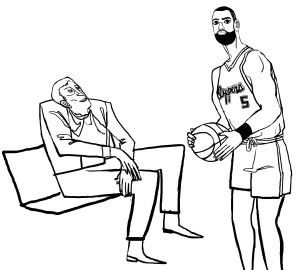Clippers owner casts sorry light on the industry
Donald Sterling, owner of the Los Angeles Clippers, is arguably one of the worst owners in professional sports.
He has been (and still is) involved in countless discrimination lawsuits. He heckles his own players on the court and refused to pay for one of his longest-tenured assistant coach’s cancer treatments because they “didn’t fall under the healthcare plan” (according to a story in the Journal Times).
Yet NBA commissioner David Stern continues to support Sterling’s tenure as owner.
That support is not necessarily explicit, but Stern’s refusal to hold Sterling to the same personal conduct policy to which he holds players and coaches indicates clear favoritism toward Sterling and owners generally.
NBA legend Elgin Baylor worked for Sterling as the Clippers’ general manager from 1986 until he was fired in 2008. Soon after, the 11-time all-star filed a wrongful termination suit on the basis that he was fired because of his race and his age.
This case is just one in a long line of civil suits against Sterling.
In 2005, Latino and black tenants in Sterling’s Koreatown apartment complex accused Sterling of trying to drive them out because of their race. Sterling lost the suit. In 2009, the U.S. Department of Justice filed a similar suit against Sterling because of his refusal to lease apartments to black people in Beverly Hills.
Take these numerous incidents, combine them with the multitude of sexual harassment lawsuits Sterling has had to take on and it’s clear the man is a liability to the NBA’s image.
If any player faced the number of lawsuits and legal issues Sterling has, Stern would have already given him a swift warning and perhaps even a suspension, in keeping with the league’s stringent conduct policy.
Let’s take Stern’s most recent comments about Orlando Magic head coach Stan Van Gundy. Van Gundy’s star player, Dwight Howard, has been fouled a league-high 593 times, but not one has been called a flagrant foul. In his frustration, Howard has been called for 16 technical fouls.
Van Gundy then voiced his disgust and disappointment, claiming Stern doesn’t allow dissenting opinions. Stern responded, saying “we won’t be hearing from [Van Gundy] for the rest of the season.”
Meanwhile, Stern has turned a blind eye to Sterling’s actions.
For Stern, money trumps all misdeeds, and the Clippers play in the second-largest media market in the United States, minimize expenses and maximize profit, meaning Sterling is an ideal owner from Stern’s spreadsheet-based point of view.
Sterling also blames everyone but himself for the on-court failure the Clippers have experienced since he became the owner. His immature antics, such as heckling former Clippers point guard and resident pastry taster Baron Davis in the middle of the game, make that clear.
It is those antics that often keep marquee players from ever signing with the Clippers despite the team’s ability to offer them more money.
Although Sterling is quick to fault everyone else, he has yet to realize that he is the problem.
Stern has coddled him and permitted him to live in a bubble. That bubble allows him to carry on with his misanthropic behavior, destroy the Clippers’ image and make a profit while doing so.
Stern’s silence signifies a level of tacit approval of Sterling’s actions.
While the players are held to a golden standard, Stern and his billionaire owners’ club, led by Sterling, stick together until the end.
Cyrus Behzadi is a freshman majoring in communication. His column, “The Extra Point,” runs Wednesdays.

